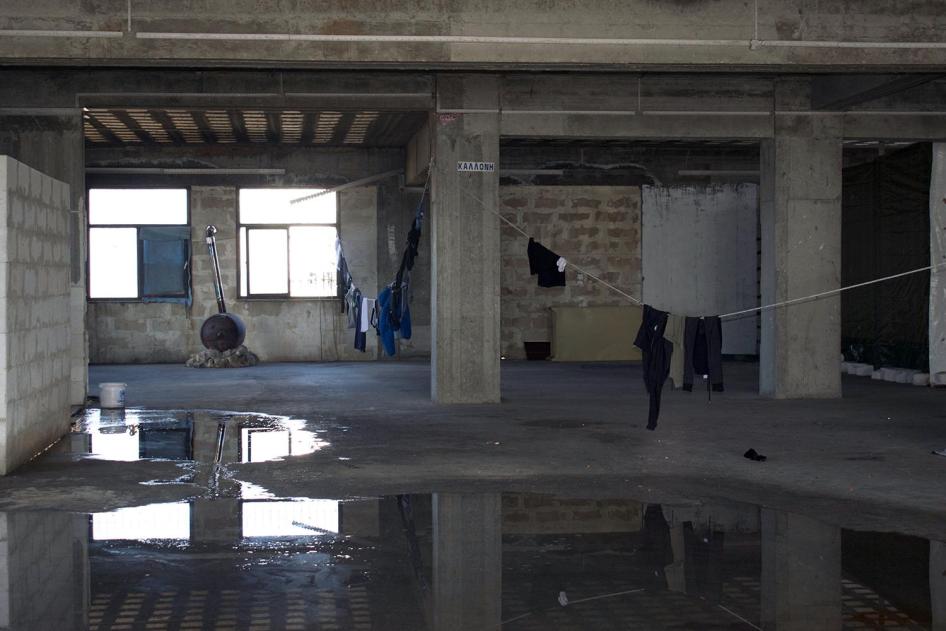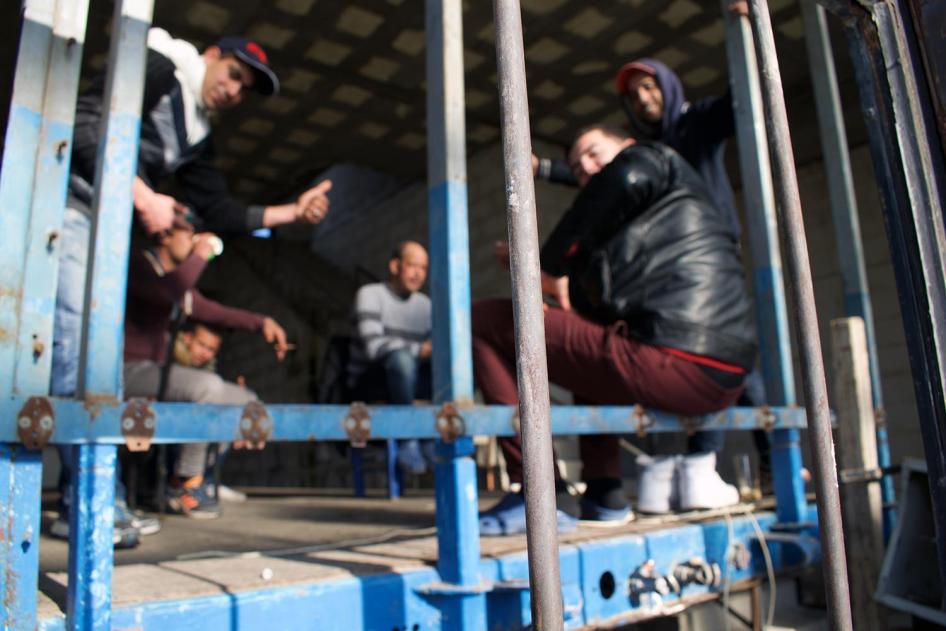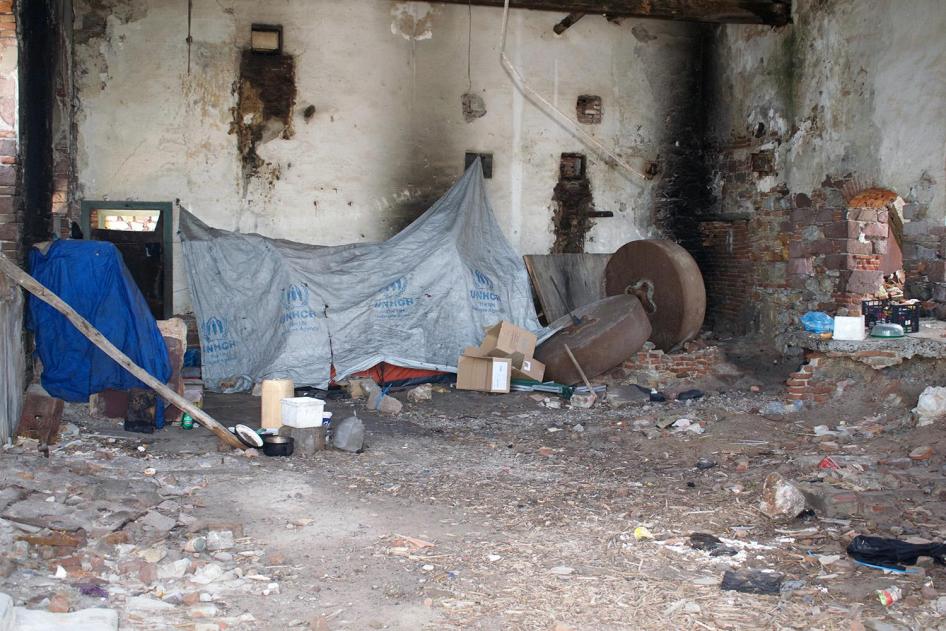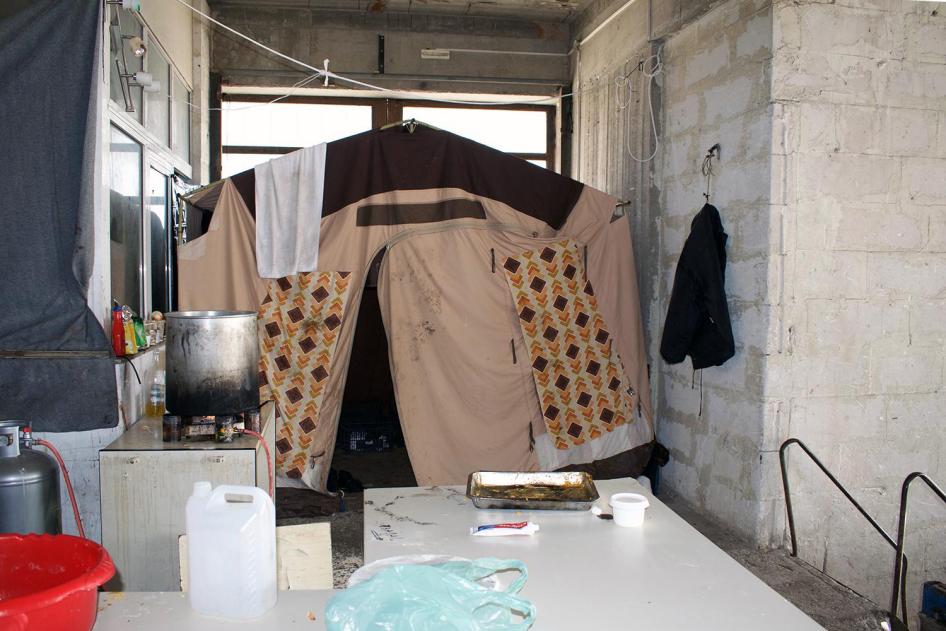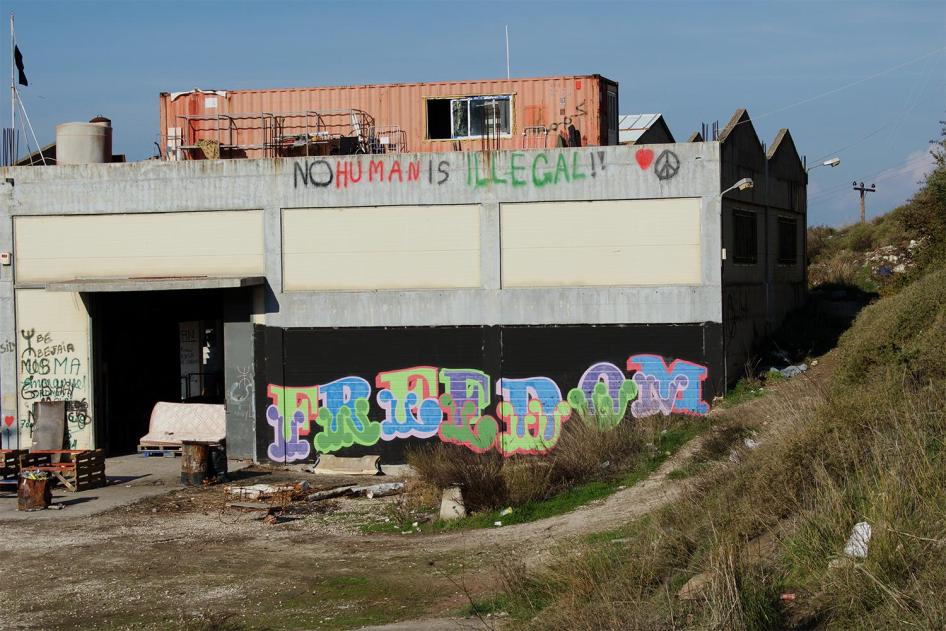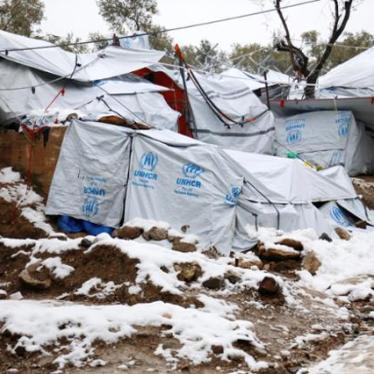I arrived on March 21 [2016] so I’m almost a year here. I don’t have a legal paper to leave the island and I don’t have money to pay a smuggler. I feel I am nothing and that I don’t have control over my life anymore. I can’t leave from the island and after such a long time here, I feel that nothing has a purpose anymore. You feel like ‘crazy,’ wandering around without knowing why.
Heavy snow, rain, and strong winds in January exacerbated the already dire conditions on the islands that are housing refugees. Mazar Ali, a 23-year-old man from Afghanistan on Lesbos, said in February:
Our tent was outside in the snow and it got destroyed [because of the snow]. We went to Eurorelief [an aid organization in charge of accommodations] to get a new tent but it took them three days to give us a new one so we slept outside. We’re not allowed to leave from the island. You feel like being in a big prison here on the island. Many times, I feel I can’t breathe freely.
43-year-old Dilshad, a Kurdish asylum seeker from Iraq who reached Lesbos in September, said in February:
They told me to go to Eurorelief, take a tent, find somewhere to put it and live there.... Since then I am living inside a [summer] tent. As you can see living conditions are not good. Food is not edible.
Three men died on Lesbos in the six days between January 24 and 30. Although there is no official statement on the cause of these deaths, they have been attributed to carbon monoxide poisoning from makeshift heating devices that refugees have been using to warm their freezing tents. In late 2016, a blast most likely caused by a cooking gas container killed an elderly Kurdish woman and her young grandchild at Moria.
Dilshad described the harsh conditions after the heavy snowfall in Lesbos, in January 2017:
My tent was coming down because of the snow. It was very hard and really, really cold. Once, a woman and a child died [inside the camp].... I want to be somewhere where I’m not in danger anymore. I am scared here.
Lack of Identification of Vulnerable Groups
The Reception and Identification Service – supported by EU agencies such as Frontex and the European Asylum Support Office (EASO), medical aid organizations, and the UNHCR – is responsible for identifying and registering people who belong to “vulnerable” groups upon their arrival. This should include torture victims, and people with disabilities, including mental health conditions. But this screening is not always effective.
Nearly all asylum seekers and migrants interviewed reported feeling that their current lives were meaningless. They said they were frightened, depressed, and in some cases, suicidal. Living on the islands perpetuates the trauma of displacement and despair and increases other threats to their safety, including physical violence and mental health concerns. Even people who do not have specific vulnerabilities should not be living under conditions that could amount to inhuman and degrading treatment, Human Rights Watch said.
“Arash,” 30, from Iran, described how conditions in the Moria hotspot, the EU-sponsored screening center on Lesbos where he’s been living since September 2016, have affected his mental state:
I’m suffering a lot here because I’ve lost my dignity. I’ve attempted three times to kill myself…. The conditions here remind me of the prison in Iran, the nightmares, the threats and the torture. The situation brings me to a very desperate condition. The medical certificates say this is not a place fit for me, but for the authorities this means nothing. Five days ago, they transferred me and my brother from the tent to a container. For six months, I was living in a small summer tent.
Arash said that during the first medical screening with Doctors of the World, he was assessed as not belonging to one of the vulnerable groups exempted from the EU-Turkey deal and allowed to move to the mainland, even though victims of torture are a protected category:
I told them I was a political prisoner, that I’ve been tortured, and suffered mock executions three times.... They asked me why I wasn’t executed and I explained this is a form of torture. I described all the physical and psychological problems I have but they wrote ‘No’ on my paper.
Human Rights Watch contacted a Doctors of the World representative in Greece about Arash’s case. The representative said that during his initial medical screening, Arash had no visible injuries on his body and declined when asked if he wanted to speak to a psychologist or social worker. Arash later did request psychological support from Doctors of the World, who then asked Greek authorities to give him “vulnerable” status as a possible victim of torture. The request was refused, the Doctors of the World representative said.
Arash said his mental health deteriorated while on Lesbos. He told us that three days before attempting to commit suicide, he tried to visit the camp’s psychologist and told them he was tortured in prison and still has nightmares. The camp reminded him of the prison. The psychologist’s response was that “there are 90 people ahead of you in the line and you have to wait.”
Earlier in 2017, Human Rights Watch documented the failure of Greek authorities and supporting partners to identify people with disabilities. Human Rights Watch also found a lack of access to mental health care and psychosocial support that is much-needed by asylum seekers and other migrants in Greece.
Ahmed and Fatima, an Iraqi couple in their late twenties, both have physical disabilities that make it very difficult for them to stand or walk. They told Human Rights Watch in October 2016 that they were not allowed to register their disabilities because they did not have a medical certificate for proof. “When we went to register [on Samos Island] they asked us for proof that we have disabilities even though they can see we do,” said Fatima, who now uses a wheelchair.
Seeking Asylum Under the Deal
“Ahmad,” a 36-year-old Syrian asylum seeker from Homs, arrived at Lesbos in July 2016. In February 2017, he described his interview under the EU-Turkey deal, in which the interviewer did not explain the purpose of the interview, would not consider his claim for asylum based on his persecution in Syria, and focused only on his time in Turkey, but did not adequately consider the lack of protection he experienced there:
When I got here they told me “either you apply for asylum or you go back to Turkey.” I applied for asylum, I got rejected, and now I am waiting for the appeal. They said “the court considered Turkey is a safe country for you so you are rejected.” I felt disappointment. They said I have to appeal or I’ll go to prison or be deported.
Ahmad said he had spent two months in Turkey, where he tried unsuccessfully to register for temporary protection. He said without registration he was denied access to health care for serious back pain because he lacked the necessary residence documents. In his interview in Lesbos, he said:
They didn’t explain the purpose of the interview but said I am not allowed to have a lawyer. They said, “if your application is rejected, then you are allowed to have a lawyer.” The most important thing during the interview was that the questions were all about Turkey. But I am not a Turkish man escaping Turkey. They should ask me about Syria instead. I always try to forget this interview. During the interview, they tried to avoid listening to what I had to say about Syria. It’s like a deal: “We need something on Turkey to reject you.”
“Willias,” a 27-year-old asylum seeker from Nigeria who arrived in Greece in June 2016, in February 2017 described his interview four months earlier:
During the interview, I was alone, I didn't have a lawyer and there was no translator. I spoke in English and I’m not good in English. I asked for a translator and the man who was in charge of the interview said the translator was not around. Then I got the negative answer. They gave me a lawyer and we asked for appeal. I don’t know what will happen, they don’t give details. I can’t go back to Turkey. I would rather die. I was in jail and I don’t like that. And the same goes for my country.
43-year-old Dilshad, the Kurdish asylum seeker from Iraq who reached Lesbos in September, gave a similar account in February:
I’ve done two interviews. Very simple questions. I don't know who they were. The interpreter was speaking Farsi. They told me there was no available interpreter for Kurdish. They didn’t explain to me what the interview was. They just told me to wait in my tent and that they will call me…. During the second interview they asked me: “If you go back to Turkey and have the possibility to get papers is it OK for you?” and I said no because I was imprisoned there.
Hussein Sherif, a 37-year-old man from Iraq who arrived in Greece at the end of August, said in February that he had not yet been interviewed: “They told me the closest date for an interview is March 23. But other people who came after me have received a closer date for an interview. I feel they treat people depending on their mood. They treat animals better than us humans.”
Hussein said he had been attacked and repeatedly stabbed on the belly by three Iraqi men, in Mytilene, Lesbos. He was hospitalized for 10 days and underwent surgery: “I went to the police to file a complaint and they told me I have to pay 100 euros and that it will take time. I left it and hid for two months in an apartment in Mytilene because I was afraid.”
In the beginning, only Syrians were going through an interview. I am one of the few who was interviewed, three months ago. But I don’t have an answer yet. There are people who’ve been here for 10 months and haven’t been through an interview and others who are 20 days here and have left for Athens.
Reza said that the purpose of the interview was not explained to him:
The man who was interviewing me was a foreigner, probably from the European Union, and there was also an interpreter. They said from the beginning that they don’t want to know if I had problems in my country and that they only care if I had problems on my way here. For many times, they asked me why I didn’t stay in Turkey, and explained to me that Turkey is a safe country. I explained to them that Turkey is not safe. It’s a harsh country and you don’t feel safe there. They’ve sent many people back in Afghanistan and when I was there authorities threatened me that they will deport me back.
Samir, 21, from Algeria, said in February that when he arrived on Lesbos, he was detained in a closed facility inside the Moria hotspot, though people of other nationalities were allowed to go in and out of the camp:
At sea [in the Aegean], Swedish coast guard caught us. After that, we were directly brought to Moria and put to prison. This is the problem. When they hear Algeria, they put us immediately into detention, even if we’ve done nothing. When I arrived, they told me that I will stay for 25 days in detention and after that, if I don’t get asylum I will be sent back to Turkey…. I stayed for eight days in prison and then I decided to escape, while going to the interview with EASO [European Asylum Support Office].
“Fezi,” a 23-year-old Pakistani man, said he fled the area he was living, in Peshawar, because of the high incidence of suicide bombings and drone attacks. He described in February what happened to him after he arrived in Lesbos:
I stayed in Moria for eight to nine months. During that period, they took me for two months to jail [immigration detention inside Moria]. I don’t know why. The police came, put me in handcuffs, and took me to jail inside Moria. They didn’t explain why. They took my papers and everything I had. After two months, they gave me my papers back and said, “You can go.” I was afraid because all Pakistanis go to the EASO interviews and they fail. Every single Pakistani is rejected except those who are Christian.
